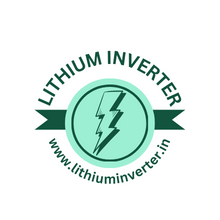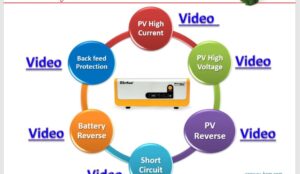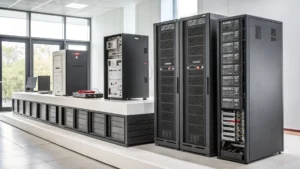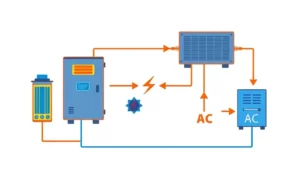Can we use a lithium battery for an inverter?
:- Yes, you can use a lithium battery for an inverter, and in many ways, it’s a better choice than traditional lead-acid batteries.

Lithium ion battery is the best choice if you’re looking to power your outdoor equipment with an inverter. Not only are they durable and designed to last, but they also offer more than enough power to handle even the most demanding tasks.
Can we use a lithium battery for an inverter?
Here’s why lithium batteries are a good fit for inverters:
Higher capacity and longer life:
Lithium batteries can store more energy and have a longer lifespan compared to lead-acid batteries. This means they can provide backup power for a longer duration during a power outage.
More stored energy, longer backup:
- Capacity: Lithium ion batteries can pack more usable energy into a smaller volume compared to lead-acid batteries. This means a lithium battery with the same size as a lead-acid battery can provide more power backup during an outage.
- Depth of discharge: Lithium ion batteries allow for a higher depth of discharge (DOD) compared to lead-acid batteries. DOD refers to the percentage of a battery’s capacity that can be safely used before needing a recharge. For example, a lead-acid battery might only allow a 50% DOD to preserve its lifespan, while a lithium ion battery might safely reach 80% DOD. This translates to more usable energy from the lithium battery during a power cut.
Fewer replacements, lower overall cost:
- Lifespan: Lithium ion batteries typically have a longer lifespan compared to lead-acid batteries. They can go through many more charge and discharge cycles before needing replacement. This translates to fewer battery replacements over time, reducing overall costs.
- Less maintenance: Lithium ion batteries require minimal maintenance compared to lead-acid batteries. Lead-acid batteries need to be checked for electrolyte levels periodically, which requires topping them off with distilled water. Lithium ion batteries are sealed units and don’t require such maintenance.
Can we use a lithium battery for an inverter?
Faster charging:
Lithium batteries generally charge faster than lead-acid batteries, allowing you to be prepared for the next power cut quickly.
The Benefits:
- Reduced Downtime: During a power outage, a faster-charging lithium battery can be recharged quicker, minimizing the time you’re without power.
- Increased Power Availability: With faster charging, you can potentially use a smaller lithium battery bank and rely on quicker recharge cycles to meet your power needs.
How it Works (Generally):
- Standard vs. Fast Charging: Regular lithium-ion battery charging involves two stages: constant current and then constant voltage. Fast charging introduces a third stage with a higher current early on, speeding up the initial charging phase.
- Inverter’s Role: Some inverters are designed for fast-charging lithium batteries. These inverters will have a built-in fast charging profile that regulates the current and voltage throughout the charging cycle.
Safety Considerations:
- Heat Generation: Faster charging generates more heat, which can stress the battery and reduce its lifespan. The inverter’s fast charging profile should manage heat generation to avoid overheating.
- Battery Chemistry: Not all lithium-ion battery chemistries are created equal. Some are better suited for fast charging than others. Ensure your lithium battery is designed for the faster charging rates your inverter provides.
Important Points:
- Not Universally Applicable: Not all inverters are equipped with fast-charging lithium batteries. Check your inverter’s specifications to see if it supports this feature.
- Battery Compatibility: As mentioned earlier, the lithium battery you use needs to be compatible with the inverter’s fast charging profile. Using an incompatible battery can damage the battery or the inverter.
Lower self-discharge rate:
Self-discharge refers to the gradual loss of stored energy in a battery even when it’s not connected to anything. Lithium-ion batteries have a distinct advantage here compared to other rechargeable batteries, like lead-acid. Let’s break down how this impacts using a lithium-ion battery with an inverter
Lower Self-Discharge in Lithium-Ion Batteries:
- Slow Internal Reactions: Compared to other battery chemistries, lithium-ion experiences minimal internal chemical reactions when idle. This means less energy is lost through these background processes.
- Stable Electrolyte: The electrolyte, the medium for ion flow within the battery, is more stable in lithium-ion batteries. This stability reduces unwanted reactions that can lead to self-discharge.
Can we use a lithium battery for an inverter?
Benefits for Inverter Use:
- Ready Power During Outages: With a lower self-discharge rate, a lithium-ion battery for your inverter will hold its charge for longer periods when not in use. This ensures you have more reliable backup power available during unexpected outages.
- Less Frequent Recharging: Since the battery loses charge slower, you won’t need to recharge it as often when it’s not powering anything. This translates to convenience and maintaining a fuller battery most of the time.
The Inverter’s Role:
An inverter itself doesn’t affect the battery’s self-discharge rate. However, since the inverter draws power from the battery when supplying AC electricity, it’s important to consider the inverter’s standby power consumption. Ideally, you want an inverter with a low standby draw to minimize overall power drain on the battery.
In essence, the combination of a lithium-ion battery’s lower self-discharge and an inverter with low standby power consumption creates a more efficient backup power system, ready whenever you need it.
Can we use a lithium battery for an inverter?
However, there are a few things to keep in mind:
- Compatibility: Make sure your lithium battery is compatible with your inverter. Inverters designed for lead-acid batteries may not have the correct charging profile for lithium batteries, which can damage the battery.
- Voltage: Lithium batteries typically have a higher voltage than lead-acid batteries. Ensure your inverter can handle the higher voltage of the lithium battery.
- Safety: Lithium batteries require specific safety precautions when compared to lead-acid batteries. If you are not comfortable working with electronics, it is best to consult a qualified electrician to ensure safe installation.




